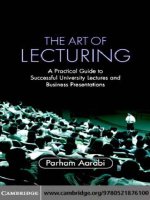cambridge university press fellow feeling and the moral life sep 2008 kho tài liệu bách khoa
Bạn đang xem bản rút gọn của tài liệu. Xem và tải ngay bản đầy đủ của tài liệu tại đây (1.12 MB, 262 trang )
P1: RNK
CUUK169-pre
CUUK169/Filonowicz
9780521888714
July 3, 2008
19:13
This page intentionally left blank
P1: RNK
CUUK169-pre
CUUK169/Filonowicz
9780521888714
July 3, 2008
19:13
F E L L OW- F E E L I N G A N D T H E M O R A L L I F E
How do our feelings for others shape our attitudes and conduct
towards them? Is morality primarily a matter of rational choice, or
instinctual feeling? Joseph Duke Filonowicz takes the reader on an
engaging, informative tour of some of the main issues in philosophical ethics, explaining and defending the ideas of the earlymodern British sentimentalists. These philosophers – Shaftesbury,
Hutcheson, Hume, and Smith – argued that it is our feelings, and not
our “reason,” which ultimately determine how we judge what is good
or bad, right or wrong, and how we choose to act towards our fellow human beings. Filonowicz draws on contemporary sociology and
evolutionary biology as well as present-day moral theory to examine
and defend the sentimentalist view and to challenge the rationalistic character of contemporary ethics. His book will appeal to readers
interested in both history of philosophy and current ethical debates.
j ose ph du ke f ilo n ow ic z is Professor of Philosophy at Long
Island University, Brooklyn Campus.
P1: RNK
CUUK169-pre
CUUK169/Filonowicz
9780521888714
July 3, 2008
19:13
P1: RNK
CUUK169-pre
CUUK169/Filonowicz
9780521888714
July 3, 2008
19:13
F E L L OW- F E E L I N G A N D
THE MORAL LIFE
JO S E P H D U K E F I L O N O W I C Z
Professor of Philosophy, Long Island University, Brooklyn
CAMBRIDGE UNIVERSITY PRESS
Cambridge, New York, Melbourne, Madrid, Cape Town, Singapore, São Paulo
Cambridge University Press
The Edinburgh Building, Cambridge CB2 8RU, UK
Published in the United States of America by Cambridge University Press, New York
www.cambridge.org
Information on this title: www.cambridge.org/9780521888714
© Joseph D. Filonowicz 2008
This publication is in copyright. Subject to statutory exception and to the provision of
relevant collective licensing agreements, no reproduction of any part may take place
without the written permission of Cambridge University Press.
First published in print format 2008
ISBN-13 978-0-511-42923-1
eBook (EBL)
ISBN-13
hardback
978-0-521-88871-4
Cambridge University Press has no responsibility for the persistence or accuracy of urls
for external or third-party internet websites referred to in this publication, and does not
guarantee that any content on such websites is, or will remain, accurate or appropriate.
P1: RNK
CUUK169-pre
CUUK169/Filonowicz
9780521888714
July 3, 2008
19:13
For Joe and Marty, Janny and George,
Martha, Marta, Joseph, and Nicholas
P1: RNK
CUUK169-pre
CUUK169/Filonowicz
9780521888714
July 3, 2008
19:13
P1: RNK
CUUK169-pre
CUUK169/Filonowicz
9780521888714
July 3, 2008
19:13
Contents
Preface
page ix
1 Fellow-feeling and ethical theory: the British sentimentalists
The school of sentiment
Two conceptions of the moral
Morality in the open street
A formidable ghost: the Sage of Malmesbury
Moral theory and moral advice
Designs of remaining chapters
1
1
6
12
25
31
37
2 Ethical sentimentalism revisited
45
Statement of the argument
Ethical rationalism
Shaftesbury’s ethical sentimentalism
Sentimentalism and rationalism
Objections to sentimentalism
45
46
48
55
59
3 Shaftesbury’s ethical system
65
Shaftesbury as moralist
The good
Obligation
Disinterestedness
Why should I be moral?
Shaftesbury’s moral sense
The limits of Shaftesburyan sentimentalism
4 Hutcheson’s moral sense
65
69
72
75
81
91
99
104
A sad tale?
Hutcheson’s moral sense
Four na¨ıve questions concerning moral sense
5 What do we perceive by moral sense?
Three received views
Defining Hutcheson’s moral “realism”
vii
104
109
119
124
124
142
P1: RNK
CUUK169-pre
CUUK169/Filonowicz
viii
9780521888714
July 3, 2008
19:13
Contents
Charting the return journey
Hutcheson’s “offensive” argument against ethical rationalism
6 C. D. Broad’s defense of moral sense theories in ethics
“Some Reflections”
The subjective theory
Analysis part 1: why moral sense theory is sentimentalistic
Analysis part 2: subjectivism versus naturalism, or, are ethical propositions
statistical?
Broad’s defense, (almost) concluded
Broad’s offensive argument against ethical rationalism
7 What is innate in moral sense?
Moral sense theory: Hutcheson, Broad and beyond
James Q. Wilson’s The Moral Sense
How do very young children come to approve (and disapprove)? occultism
versus obscurantism
The “hyperoffensive” argument against ethical rationalism
Ideas without will
Postscript: Hume, Smith and the end of the sentimental school
Bibliography
Index
149
154
161
161
163
173
182
188
195
201
201
206
214
223
231
233
239
246
P1: RNK
CUUK169-pre
CUUK169/Filonowicz
9780521888714
July 3, 2008
19:13
Preface
This book originated, in a strange way, at a particular moment in the late
1970s when a very practical, unphilosophical question was posed to me by
someone whom I admired (and still do) very, very much. As I fumbled
about for a dissertation topic (while studying at Columbia University in
New York City) my professor and adviser Mary Mothersill asked, “Why
not do something in the history of ethics?” I must have had grand delusions
of solving the riddle of consciousness (or something) and she must have
sensed, not that I might turn out to have some natural talent for writing
about the history of moral philosophy but rather that the general subject
might be relatively “easy” enough for me, given my slow-to-develop philosophical comprehension. Almost right away I discovered D. D. Raphael’s
two volume British Moralists 1650–1800 on the shelves of the seventh floor
lounge of Philosophy Hall, and that, as they say, was that. Hobbes, Butler,
Mandeville, Hutcheson – they were talking about real people, about questions people actually ask themselves concerning how to live, about real life,
about you and me. I went on to write the dissertation about Shaftesbury and
his rather curious notion of a natural affection and equally exceptional idea
that the natural affections are somehow or other “the springs and sources
of all actions truly good.” And now, so many years later, that essentially is
what the present book is still about (though none of it is recycled, I assure
you).
This is a handcrafted, very homespun piece of work (even the index). I do
not have a long list of “big name” associates to credit, from discussions with
whom I have profited. In fact there are only two well-known philosophers
who, at a much earlier stage, were kind enough to take a look at what
I was doing and criticize it (rather sharply, I might add): J. B. Schneewind
(whom I met only once) and (naturally) Mary Mothersill. And I do credit
and thank them officially here. Especially Mary. She probably disagrees with
90 per cent of what I say about ethics but that never mattered one bit –
at least to her.
ix
P1: RNK
CUUK169-pre
CUUK169/Filonowicz
x
9780521888714
July 3, 2008
19:13
Preface
I do have a somewhat longer list of people to thank here at my home
university over the past twenty-one years, which we call simply “LIU.”
I think of them as my circle of encouragement: Robert Spector, Gerald
Silveira, Bernice Braid and Terence Malley (English), Elinor West, Margaret Cuonzo and Amy Robinson (philosophy), Cynthia Maris Dantzic
(art), John Ehrenberg (political science), Joram Warmund (history), David
Cohen (my college Dean), and David Steinberg (our university’s President).
Naturally, I will always remain grateful to my dissertation advisors back at
Columbia: Richard Kuhns, Charles Larmore, Sidney Morgenbesser and
(again, of course) Mary Mothersill.
I have never met sociologist James Q. Wilson, whose arguments in The
Moral Sense take the lead in my seventh and final chapter. But when that
book came out in 1993 I (rather brassily) wrote to him to express my
admiration and impose on him my first paper on the sentimentalists. He
graciously wrote back to me from his office at UCLA saying that he had
“found my essay criticizing rationalism to be quite good, and to reflect [his]
own views.” That certainly was encouraging. I hope that he will be pleased
by the present work, which is in part a tribute to his own keen eye for the
intricacies of family life and the awkward yet inexorable moral development
of every young child. (A modern-day Hutcheson, to my mind.)
The work of Thomas Nagel (who is not known to me personally) has
been a continuing influence and source of enrichment, even when used,
as here, as something of a foil for the sentimentalists rather than engaged
with on its own terms.
I consider Frederick Seymour Michael practically as co-author of
chapter 5, composed throughout the summer of 2006. Each week I would
ride two buses to get to Brooklyn College, his home institution, where we
would sit on assorted benches and stairways arguing about what Hutcheson
was saying about moral sense and debating such eminently impractical
subjects as how various thinkers of the Scottish Enlightenment understood the workings of representative concomitant ideas, how Satan’s moral
sense might have come to be so corrupted, whether cats subject to physical abuse by young boys might resent rather than merely dislike their
ill-treatment, and so on. So I was very happy when, in early September,
Fred finally approved the chapter, for I felt that we must have produced
something solid and broadly accurate concerning Hutcheson’s ideas, having
discussed them so carefully. So if we did, he gets half the credit, and half
the blame (except for the actual writing) if we did not. I also thank Emily
Michael, a scholar of Hutcheson’s aesthetics as well as distinguished chairperson of the philosophy department there, for her own encouragement
P1: RNK
CUUK169-pre
CUUK169/Filonowicz
9780521888714
July 3, 2008
Preface
19:13
xi
as well as for allowing me to borrow her husband for a good part of that
summer.
Of course I am especially indebted to Hilary Gaskin, senior commissioning editor for philosophy, and the readers, at Cambridge University Press.
Such perceptiveness, such forthright honesty, such awe-inspiring professionalism – I have never worked so hard or learned so much, so fast, in
my life. I am also grateful to the present editors of History of Philosophy
Quarterly and Scholars’ Facsimiles & Reprints for their permission to use
materials that originally appeared in those publications (in 1989 and 1991)
in chapters 2 and 3, respectively, of this book.
Finally, rather than merely thank my parents, my siblings, my beautiful
wife Martha and the three extraordinary children we share, I have dedicated
this book to all of them.
Although my project is aimed primarily at scholars of ethics and its
history and historians of ideas generally (whom I hope to provoke or at
least challenge in sundry ways) I believe I have succeeded – with all of
these people’s help – in writing in language that is accessible to scholars
of eighteenth-century ideas and culture, students of philosophy and history, and non-philosophers and interested laypersons (non-academics) –
in other words, members of the general reading public. I have avoided
needless “isms,” charts, technical vocabulary, quantifiers, peculiar modallogical operators and so on, and have tried to write in plain, clear language
for the benefit of any interested intelligent reader. That is after all what
the British Moralists did; their questions about people, their motives, their
ethical possibilities, came to them naturally and still concern everybody.
To try to understand and decide the merits of their competing answers
is intrinsically rewarding for any thoughtful person. If I have made that
activity a bit more accessible and attractive for a few more people, and little
else, then – to borrow the title of one of Bach’s recitatives, from the Little
Notebook for Anna Magdalena – “It is enough” (Ich habe genug).
P1: RNK
CUUK169-pre
CUUK169/Filonowicz
9780521888714
July 3, 2008
19:13
P1: RNK
9780521888714c01
CUUK169/Filonowicz
9780521888714
July 3, 2008
19:6
chap t e r 1
Fellow-feeling and ethical theory:
the British sentimentalists
If any enquire, “Whence arises this Love of Esteem, or Benevolence,
to good Men, or to Mankind in general, if not from some nice Views
of Self-Interest? Or, how we can be mov’d to desire the Happiness
of others, without any View to our own?” It may be answer’d, “That
the same Cause which determines us to pursue Happiness for our
selves, determines us both to Esteem and Benevolence on their proper
Occasions; even the very Frame of our Nature, or a generous Instinct,
which shall be afterwards explain’d.”
Francis Hutcheson, An Inquiry Concerning Moral Good and Evil
the school of sentiment
It will swiftly become evident that this book of philosophy has a central
hero – Francis Hutcheson (1694–1746). Hutcheson is an admirably clear
writer, but I take my starting-point from the above uncharacteristically enigmatic (or perhaps just poorly written) passage. I would rewrite it somewhat
as follows: Why do we approve and admire persons whose conduct displays
genuine concern for others, if that concern in no way benefits us? (And
why should we even care what happens to others in the first place?) The
answer is that, just as we instinctively desire our own happiness, we are
innately disposed not only to care about the good of others to some degree,
but also to approve of such other-regarding concern whenever we see it at
work. My own thesis is that Hutcheson’s answer is, on the whole and at the
end of the day, true, and that there is just such a generous instinct in all
of us. (And that this has wide-ranging implications for moral philosophy.)
To make his claim plausible, Hutcheson appeals directly to observations of
young children.
The Universality of this moral Sense, and that it is antecedent to Instruction, may
appear from observing the Sentiments of Children, upon hearing the Storys with
which they are commonly entertain’d as soon as they understand Language. They
always passionately interest themselves on that side where Kindness and Humanity
1
P1: RNK
9780521888714c01
CUUK169/Filonowicz
2
9780521888714
July 3, 2008
19:6
Fellow-Feeling and the Moral Life
are found; and detest the Cruel, the Covetous, the Selfish, or the Treacherous. How
strongly do we see their Passions of Joy, Sorrow, Love, and Indignation, mov’d by
these moral Representations, even tho there has been no pains taken to give them
Ideas of a Deity, of Laws, of a future State, or of the more intricate Tendency of
the universal Good to that of each Individual!
Many will dismiss this as romantic fantasy, sentimentality – but I take it
to be scientific fact. Others, contemporary philosophers in particular, will
have nothing to do with the idea of a moral sense, considering it to be an
historical curio, a sort of philosophical white elephant. But I shall argue that
there is a moral sense and explain as exactly as I can what it is.1 And I will do
this not by condensing articles from scientific journals – which could never
suffice in any case – but rather by examining history, in this case the history
of ethical speculation in the era of the sentimental school in early-modern
British moral philosophy. I am specifically concerned with the thought of
Shaftesbury and Hutcheson, and to a somewhat lesser degree that of Hume
and Smith – yet equally interested in the relationship of that school of
philosophy to contemporary ethics. It was early-modern sentimentalism
that first gave birth to and articulated the concept of moral sense, and I
wish to explore that context in order to know better what role that idea
could or should have in moral theory today.
My study has the form of an extended narrative (though the chronology
is hardly linear), an attempt to retell the story of ethical sentimentalism
in a new, more logical manner – a kind of pilgrimage, backward in time,
to the origin of the sentimental school and thenceforth a return to ethics
in the present day. I am by no means the first to characterize Shaftesbury,
Hutcheson, Hume and Smith as the leading proponents of a single school
of ethics; Sir L. A. Selby-Bigge divided his classic anthology British Moralists
(1897) into volumes under the headings, “the sentimental school” and “the
intellectual school,” including in the first the same authors whom I propose
to call the British sentimental moralists.2 But there has never been a study
of these thinkers altogether as sentimentalists, and no one (it appears to
me) has explained the underlying logic of the sentimental school. How
exactly were these particular philosophers sentimental moralists; what does
it mean to say that they were? What unites them as proponents of a single tradition, a distinctive line of ethical speculation? What are the basic
1
2
Moral sense theory, as I develop it, is (quite roughly) the view that fully disinterested moral approbation
and disapprobation cannot be accounted for without recourse to several innate factors at work in
ethical judgment having nothing as such to do with reason.
With the exception that Hume was given his own separate volume; also, Selby-Bigge included Bishop
Butler among the sentimentalists – which I do not, for reasons explained in chapter 4.
P1: RNK
9780521888714c01
CUUK169/Filonowicz
9780521888714
July 3, 2008
19:6
Fellow-feeling and ethical theory
3
principles of sentimentalism as a type of ethical theory, and supposing
we can state them meaningfully and interestingly, to what extent are they
important and true? I begin with the quite modest claim, or rather assurance, that there indeed was a sentimental school in eighteenth-century
England, Ireland and Scotland – loose-knit to be sure, but real and influential in its day. I then offer a rough and ready historical sketch of its career
and try to express (intuitively and in a timeless sort of way) its main unifying
principles.
Sentimentalism began in the days when assorted churchmen, aristocrats and pamphleteers felt called upon to combat – both theoretically
and in the popular imagination – the infamous selfish theory of Thomas
Hobbes, along with all of its evidently dangerous anti-moral implications.
It was carried on through a rich debate among the anti-Hobbesian moralists themselves over whether the best defense of traditional morality lay in
reason and metaphysics – the intellectual or rational camp – or instead in
our innate sociability and fellow-sympathy – the sentimentalists. The latter view evolved in the hands of the Third Earl of Shaftesbury and Francis
Hutcheson into what we now call “moral sense theory,” which was then
roundly criticized by both rational moralists and at least one fresh sponsor of the selfish theory, Bernard Mandeville. Later on both David Hume
and Adam Smith endeavored to distance themselves from the notion of
such a peculiar moral sense (though not wholly successfully, on my reading). Finally sentimentalism advanced outward and onward, so to speak,
in Hume’s endorsement of something very like a utilitarian standard for
ethics and Smith’s theory of the impartial spectator.
I believe that at least one important strand in sentimental ethics first took
shape in the work of the Cambridge Platonists, especially in the sermons of
Benjamin Whichcote and the aphorisms of John Smith. But sentimentalism
was first expounded as a recognizable school of ethics, at least halfway
coherently, by Shaftesbury. Yet Shaftesbury would have been unable to
do even that much had it not been for much previous solid intellectual
work on the part of his own arch-nemesis, Hobbes. It was then developed
into something more like a genuine ethical theory by Hutcheson, who,
however, eventually partially abandoned its basic principles. Bishop Joseph
Butler, despite his affinities (and debts) to Shaftesbury and Hutcheson,
came very close to subverting the sentimental school by sowing serious
doubts as to whether it could ever render a satisfactory explanation, or
justification, for morality properly understood. Notwithstanding Butler’s
acute criticisms of both Shaftesbury and Hutcheson, British sentimentalism
was then perfected by Hume and Smith. But in the course of their refining
P1: RNK
9780521888714c01
CUUK169/Filonowicz
4
9780521888714
July 3, 2008
19:6
Fellow-Feeling and the Moral Life
and polishing these two conceded a bit too much to their own rivals, the
intellectualists. In their hands sentimentalism lost much of its urgency, its
electricity, as a distinctive and unprecedented school of ethics.
Thus the history of sentimentalism, on my telling of it, is fairly short and
rather melancholic. It began in the second half of the seventeenth century
and was past its best by the last quarter of the eighteenth, shortly before
the time of Immanuel Kant. Then the school of sentiment was effectively
laid to rest. This in stark contrast to its rival, the intellectual school, which
remained alive and flourishes even (and especially) in the present day. Its
enrollment dropped to zero; its original principles, such as they were, were
consigned to histories of ethics, nevermore debated or defended within
what soon would become professional academic philosophy.
But what were those principles? Sentimentalism, as it seems to me, weaves
together three distinguishable strands of thought, with none obviously
fundamental to either or both of the others. One is that people certainly
do practice genuine altruism in their everyday dealings with one another,
Hobbes notwithstanding, and when they do an essential factor in what is
going on is a certain affective sensitivity on their parts to the good, the
“weal and woe” of other persons, and a disposition to experience and act
upon certain emotions and desires that aim, quite independently of abstract
rational considerations of what is good or right as such, at those others’ welfare. Call this sort of moral affection “fellow-feeling” for short, and call the
elaboration and defense of this general hypothesis sentimentalism’s motivational enterprise. A second, though closely related, line of thought might be
called its justificational project. Sentimental moralists claim that in order to
be fully successful, any justification for practicing altruism, living ethically,
acting with regard to the interests of others, must appeal, ultimately, to
human desires and emotions that are already other-regarding and benevolent in some sense on their own, prior to any abstract considerations
concerning how one ought to live and act. Successful ethical justification,
in other words, must appeal to our sympathies, our natural concern for
others; reason, detached from affect, emotion, passion, can never supply
a satisfactory answer to the question, why be moral? or establish a general
requirement that we live ethically. Naturally much hangs on what counts
as a successful justification in ethics, but the basic idea is roughly this: Any
proposed rational justification of altruistic ethical principles and ways of
life, if it is to succeed, must be capable of motivating those who accept it
actually to act accordingly. Justifications that purport to bind us to such
principles and ways of life without in any way depending for their force
on our extra-rational feelings for others, our sentiments, are themselves
P1: RNK
9780521888714c01
CUUK169/Filonowicz
9780521888714
July 3, 2008
19:6
Fellow-feeling and ethical theory
5
bound (for various reasons) to fail. A third strand in sentimentalist thought
might be called axiological – an old-fashioned but perfectly suitable term.
Sentimentalists believe that there is something especially, perhaps uniquely
valuable in certain kinds of ethical motivations, namely those involving
genuinely disinterested and distinctly emotional concern for others – sympathy, compassion, care, kindness – once again, fellow-feeling.3 Shaftesbury
called this spontaneous concern natural affection, the Cambridge Platonists called it love, Hume named it a principle of humanity. I call it (later on
and for purposes of my own) sentimental benevolence. This third aspect of
sentimentalism is probably the hardest to spell out and certainly the most
difficult to defend. Indeed the problem of imagining what an argument
for ascribing special worthiness to those sorts of motives in preference to
others, such as self-interest, conscientiousness or duty, is partly what drove
Hutcheson to propose his moral sense theory in the first place, with all of
the problems it in turn raised. This axiological strand of thought is undeniably there in the British sentimentalists, and I shall explain and support
it as best I can (or perhaps explain exactly why it cannot properly speaking
be defended at all).
Now it goes practically without saying that the vague notions of being
motivated, justified or ennobled by moral sentiment or its twin, reason,
that I have used in stating the rough idea of sentimentalism cannot be
left standing as mere dummy predicates but require much clarification
and defense as genuine concepts, or families of related concepts. After all,
that is precisely what Shaftesbury, Hutcheson, Hume and Smith (and their
rational rivals) were up to for a good deal of their time on the philosophic
scene – and this will be one main focus of my study.
It would be natural for the reader to expect right about here a statement
of my historical methodology, the structures and relationships among the
particular chapters and so on, and only then for the actual journey to
commence; but I would like to reverse the procedure, so to speak, and start
by presenting an argument of some kind for concerning ourselves with
the British sentimentalists at all. The sentimental school had its day so
why go back to it, why regard Shaftesbury, Hutcheson and the others as
being of more than antiquarian interest? My answer is this: philosophers
have always been obsessed with two questions: What is knowledge? And
what is reality? In ethics, I believe that so much weight has been given
to the knowledge question, the question of moral justification, that it has
3
This is the strand that is particularly visible in Whichcote and John Smith and preserved in the
work their sole defender, Shaftesbury, then later taken up by Shaftesbury’s own principal heir and
systematizer, Hutcheson.
P1: RNK
9780521888714c01
CUUK169/Filonowicz
6
9780521888714
July 3, 2008
19:6
Fellow-Feeling and the Moral Life
blinded a good many thoughtful people to an important dimension of
moral reality, namely the role of affect (feelings, emotions, sentiments) in
moral perception, judgment and motivation. Sentimentalism may show
itself to be realistic in a way that its traditional rival, ethical rationalism, is
not; therefore the work of its originators deserves careful and respectful reexamination. It might be better at this early stage (or at least safer) to say that
sentimentalism is important because it includes an important dimension
of moral reality, morality, morals, to which rationalism, almost by its very
nature, remains blind or indifferent.
But I wish to leave all such “isms” out of things, or at least off to the side,
for the present, and begin by sketching two very general conceptions of
morality or of “the moral institution of life,” in Butler’s memorable phrase.
The first seems to me to be at work, mostly by being taken for granted, in the
vast majority of books and articles I read on the subject of what is nowadays
called ethical theory. I will call it the “system of reasons” view of morality,
of what is moral in human life and experience – and then contrast it with
a quite different conception, calling that (naturally) the sentimental view.
t wo conceptions of the moral
On the first view, morality forms, or simply is, a system. A system of what?
I would say, a system of rules, principles or (more fashionably nowadays)
norms, which govern – or are such that they ought to govern, even when
they do not – people’s conduct towards others (their “manners and conversations one towards the other,” as Hobbes would say). These principles fall
into two main categories, namely (speaking crudely) positive obligations
or duties towards others – things one has to, or must, do – and negative
constraints (things one must not). People should keep their word, tell the
truth, assist helpless victims in need, care for their own children, and so
on, and, on the other side, must not steal from, deceive, or otherwise cause
gratuitous harm to others. For simplicity let’s call both obligations and constraints ‘moral demands.’ There are at least two leftover categories of moral
things, on the reasons view. Morality is supposed to allow for options, or
free choices: You may if so moved go way out of your way to help a stranger
in need, or on the other side, may certainly go to a movie rather than spend
that two hours working as hard as you can to improve everyone’s lot; moral
demands are ordinarily overriding but not (so to speak) all-consuming.
Finally, morality is thought to include a class of “duties to self ” – to exercise a reasonable prudential regard to one’s own health and well being,
to develop one’s natural aptitudes and talents, and so forth. These moral
P1: RNK
9780521888714c01
CUUK169/Filonowicz
9780521888714
July 3, 2008
19:6
Fellow-feeling and ethical theory
7
demands are not to be identified with legal demands, though it seems very
natural (to philosophers writing from within this conception of the moral)
to speak of our being subject to or governed by requirements of both sorts.
The contrast, roughly, is that human beings create legal and penal systems
to govern their behavior from the outside, whereas they govern themselves
by moral principles (demands) in the field, as it were, without the need for
external sanctions – unless of course one stretches the meaning of sanctions
to include the moral disapprobation, censure or outrage of other moral
agents within the system.
Now I do not believe that these ideas are wholly artificial, purely
the creations of moral philosophers; I think that most ordinary (nonphilosophically inclined) people possess some notion of moral obligation,
of what is morally required, allowable, unacceptable, and so on. They think
and judge and act, in some sense and at least occasionally, in terms of moral
reasons. But once today’s moral theorists step in they mostly tend immediately to clarify the idea of morality as a system of reasons (demands, options
and so on) in a rather predictable, almost automatic fashion.4 For example,
one question philosophers typically feel impelled (and qualified) to address
right away is this: what sort of thing is this system? (What is the ontological
status of moral demands, options, and so on? What sort of reality do they
enjoy, in what medium, so to speak, do they subsist?) Here I believe there
is a conventional, almost ritualized answer to be given. It is not simply
to claim that the question itself is illegitimate. Rather the answer to the
question, where is morality, is this: Morality is inherent in practical reason.
As rational agents we share a capacity not just to apprehend reasons for
believing what is true (what exists, what causes what) but also to discern
reasons for doing one thing rather than another. And the capacity to act for
(be motivated to act upon) those very reasons. Morality, it turns out, then,
is simply an expression (and in some sense the most important one) of
this very capacity for reasoning practically. It is not some diaphanous force
moving about in the world (or in us) but rather a certain manner in which
we come to the world as rational beings deliberating about and choosing
what to do in it. So the philosophers’ short answer to the question, what is
morality a system of, is this: it is a system of practical reasons for action.5
4
5
Some start by tidying things up, by asking (for example) whether the notions of moral options and
moral demands are ‘co-relative’ (maybe free choice is just the realm of action where duties leave off ),
or whether prudential concern is ultimately justifiable on utilitarian grounds (as enhancing our ability
to discharge our duties to others).
Feelings (emotions, sentiments) get themselves mentioned occasionally, but then the main issue
straightaway becomes when and why it makes sense – i.e. is rational – to have them. (See my note
on philosophical ‘isms’, below (n. 48).)
P1: RNK
9780521888714c01
CUUK169/Filonowicz
8
9780521888714
July 3, 2008
19:6
Fellow-Feeling and the Moral Life
This is how a good many moral philosophers today tend to talk, and the
manner in which they practice ethics, moral philosophy, reflects this way of
conceiving and speaking of the moral in a way that almost suggests a kind
of predestination. If morality is a system of reasons for acting, we obviously
need a theory of reasons, and of what it is to reason practically about what
to do. So the first step is to propose and defend a theory of practical reason
and of its relation to intention and action. Move next to the question,
what in general is a good reason for acting. Finally demonstrate as best you
can that moral reasons for acting are very good reasons for acting indeed.
As practical agents we all have powerful, even overriding reasons to act
morally, to act in accordance with moral demands. To do less would be
(in one fashion or another) to betray our own nature as practically rational
beings, to fail to live and act fully rationally. Hence morality is rationally
demanded of everyone. Accordingly it is the job of every moral theorist to
prove this (and then, or along the way, to work out in precise detail what
those demands actually are).6 The whole spirit of this approach to ethics is
perhaps best captured by Stephen L. Darwall when he writes (in Impartial
Reason, 1983), “One moralist after another has sought to demonstrate that
it is contrary to reason to flout ethics. And although no particular attempt
has been found compelling, indeed not even by a consensus of the moralists
themselves, they continue to assert what they feel in their bones: that it must
be so.”7
There is one other important feature of the reasons conception of morality (and of ethics) that must be mentioned right away, and that is its general
idea of moral motivation. Morality, whatever it is, is agreed by virtually
everyone to be more than merely notional (like the square root of negative one, or the set of all sets); it is believed to have real effects in the
shared world, to “produce or prevent actions,” as Hume famously put it.
So even if it is contrary to reason (in some very abstract or theoretical
way) to flout moral demands, what is it that can actually move people to
pay heed to them, to conform to them in what they do – that is, to act
6
7
To put this in another way: philosophers deal in arguments, and they propound and challenge
arguments by giving reasons. Arguing (coolly) is simply giving reasons. But ethics, it is almost
universally agreed, concerns questions about what to do, how to live. Questions of how to live and
act are questions about what sort of life makes most sense – i.e. is most reasonable – to live, are they
not? Ergo we need a theory of reasons for acting (especially good ones), do we not? Since these good
reasons invariably turn out to include (a system of ) reasons to be moral, then to be indifferent to
moral norms, reasons, demands or what have you is ipso facto to live irrationally, to act for bad reasons
or none at all. (And the usually unspoken moral of it all is that the more sensible you are about
things the better you must be, as a moral agent.) Case closed. In short, since the central business of
philosophy just is rational justification, the subject matter of ethics simply must be moral reasons –
and only moral reasons.
p. 13.
P1: RNK
9780521888714c01
CUUK169/Filonowicz
9780521888714
July 3, 2008
19:6
Fellow-feeling and ethical theory
9
practically reasonably? Accounts vary, but here too I think there is something like a near-universal consensus on the subject. Moral demands motivate or restrain us in acting because as practically rational beings we humans
possess a capacity for moral autonomy or (as it has recently become more
fashionable to say) normative self-governance (or self-government). And
here I think it is critically important to allow a distinguished upholder of
the reasons conception of ethics to speak for herself; I have selected the
following eloquent passage from Christine M. Korsgaard’s commentary on
the work of Frans de Waal, in Primates and Philosophers (2006).
The animal’s purposes are given to him by his affective states: his emotions and his
instinctual or learned desires . . . The end that the animal pursues is determined
for him by his desires and emotions . . . Kantians are among the philosophers who
believe that a deeper level of assessment and therefore choice is possible. Besides
asking yourself how to get what you want most, you can ask yourself whether your
wanting this end is a good reason for taking this particular action. The question
is not merely about whether the act is an effective way to achieve your end, but
whether, even given that it is, your wanting this end justifies you in taking this
action . . . Even if you do judge the action to be justified and act, you are acting
not merely from your desire but from your judgment that the action is justified.
Why do I say this represents a deeper level of intentionality? In the first place,
an agent who is capable of this form of assessment is capable of rejecting an action
along with its purpose, not because there is something else she wants (or fears) even
more, but simply because she judges that doing that sort of act for that purpose
is wrong. In a famous passage in the Critique of Practical Reason, Kant argued
that we are capable of setting aside even our most urgent natural desires . . . to
avoid performing a wrong action . . . Now if we are capable of setting aside our
purposes when we cannot pursue them by any decent means, then there is also a
sense in which when we do decide to pursue a purpose, we can be seen as having
adopted that purpose. Our purposes may be suggested to us by our desires and
emotions, but they are not determined for us by our affective states . . . Since
we choose not only the means to our ends but also the ends themselves, this is
intentionality at a deeper level . . . Another way to put the point is to say that we
do not merely have intentions, good or bad. We assess and adopt them. We have
the capacity for normative self-government, or, as Kant called it, “autonomy.” It is
at this level that morality emerges. The morality of your action is not a function
of the content of your intentions. It is a function of the exercise of normative
self-government.8
[T]he capacity for normative self-government and the deeper level of intentional
control that goes with it is probably unique to human beings. And it is in the
proper use of this capacity – the ability to form and act on judgments of what we
ought to do – that the essence of morality lies, not in altruism or the pursuit of
the greater good.9
8
“Morality and the Distinctiveness of Human Action,” pp. 110–12.
9
Ibid., p. 116.
P1: RNK
9780521888714c01
CUUK169/Filonowicz
10
9780521888714
July 3, 2008
19:6
Fellow-Feeling and the Moral Life
Obviously Korsgaard touches on several core issues of contemporary philosophy, here, but the immediate point is this: How, on the reasons conception
of morality, do moral reasons, moral demands, shape people’s actual conduct, their manners and conversations? The answer is that people adopt
them for their own actions; they judge that they ought to act on them, and
then act on those judgments. When men and women properly use their
capacity to judge and act in this fashion, there is the essence of morality,
the moral.
So that is one concept of morality and (in bare outline) one conception
of what ethics, moral theory, is supposed to be about, which seems to ‘fit’
it remarkably perfectly. But (even as Korsgaard’s last sentence suggests) this
view of the moral is not the only one to have been proposed and that is
also true of the approach to ethics that goes with it. There are other ways
of conceiving morality and what philosophers are supposed to say and do
about it.10
In “The Fourteenth Ward” (chapter 1 of Black Spring, 1959), Henry Miller
imparts a charming depiction of his own boyhood, coming into his own
on the streets surrounding the old Navy Yard in Williamsburg, Brooklyn at
the approach of the first World War. But his narrative centers about what
I take to be a genuinely philosophical claim, which seems to haunt me
whenever I sit down to study or to ‘do’ ethics.
To be born in the street means to wander all your life, to be free. It means accident
and incident, drama, movement. It means above all dream. A harmony of irrelevant
facts which gives to your wandering a metaphysical certitude. In the street you learn
what human beings really are; otherwise, or afterwards, you invent them. What is
not in the open street is false, derived, that is to say, literature.
The boys you worshipped when you first came down into the street remain with
you all your life. They are the real heroes. Napoleon, Lenin, Capone – all fiction.
Napoleon is nothing to me in comparison with Eddie Carney, who gave me my
first black eye. No man I have ever met seems as princely, as regal, as noble, as
Lester Reardon, who, by the mere act of walking down the street, inspired fear and
admiration. Jules Verne never led me to the places that Stanley Borowski had up
his sleeve when it came dark. Robinson Crusoe lacked imagination in comparison
with Johnny Paul. All these boys of the Fourteenth Ward have a flavor about them
10
I happen to agree with Lawrence A. Blum that it is highly unlikely “that all the deliverances of the
ordinary moral consciousness, even our most deeply held ones, are entirely compatible with one
another and can be brought together within a common system [my emphasis].” (Friendship, Altruism
and Morality, p. 8.)
This is connected with the fact that the concept “moral” itself cannot rightly be given a unitary
meaning, but rather bears the heritage of different moral traditions from which it gathers different
sorts of meanings . . . the assumption of unity seems to me an article of faith, not borne out by
experience.
P1: RNK
9780521888714c01
CUUK169/Filonowicz
9780521888714
July 3, 2008
19:6
Fellow-feeling and ethical theory
11
still. They were not invented or imagined: they were real . . . Why, even now when
I say Johnny Paul the names of the saints leave a bad taste in my mouth. Johnny
Paul was the living Odyssey of the Fourteenth Ward; that he later became a truck
driver is an irrelevant fact . . .
“In youth we were whole and the terror and pain of the world penetrated
us through and through.” But later “comes a time when suddenly all seems
to be reversed.”
We live in the mind, in ideas, in fragments. We no longer drink in the wild outer
music of the streets – we remember only. Like a monomaniac we relive the drama
of youth. Like a spider that picks up the thread over and over and spews it out
according to some obsessive logarithmic pattern . . .11
“What is not in the open street is false, derived, that is to say, literature.” Now in one obvious sense all ethics, all moral philosophy, has to be
literature; its job is not to feel warships at a distance, “watch the goings-on”
above the tavern on Saturday nights or lead us on after-dark adventures.
Rather its task, presumably, is to analyze moral concepts, clarify ethical
propositions, enunciate principles, construct theories and defend or assail
them with arguments – and then, if things go well, to shape our actual moral
practice. And what could life in the open street (or even remembering it)
have to do with any of that? It is even possible, indeed quite common, to
conceive ethics as a wholly a priori pursuit. It is supposed to tell us not
what people really are, or how they actually behave, but instead how they
ought to be, ought to act.
But Miller’s words suggest to me the following, at least as an hypothesis:
perhaps ethics has some obligation to try, at least, to be true to what people
really are, true to what is in the open street.12 If ethics has to be literature then
perhaps, other things being equal, it is worse literature to the degree that
it merely invents people, and better in so far as it manages to help us learn
what human beings really are. If that is so, it seems to me we may have a very
good reason even now for being suspicious of the whole notion of ethics I
just described, and of the system of reasons view of what morality consists
in that it reflects, embodies and supports (and perhaps one good reason
already for going back to the sentimentalists). For both do seem to miss, or
11
12
Black Spring, pp. 3–10.
Compare Marcia Cavell, writing in 1975: “Moral judgment, like aesthetic judgment, suffers the
more rigid it is, the less geared to this particular situation and person. As William Gass remarks [in
“The Case of the Obliging Stranger”]: ‘Ethics . . . is about something, and in the rush to establish
principles, to elicit distinctions . . . and to discover ‘laws,’ those lovely things and honored people,
those vile seducers and ruddy villains our principles and laws are supposed to be based upon and
our ethical theories to be about are overlooked and forgotten.’” “Taste and the Moral Sense,” p. 30.









